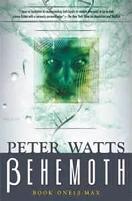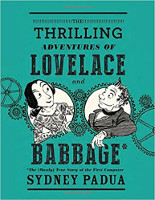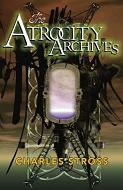 Now here's a book with an interesting/messed up history – Behemoth is the final, (in)famous instalment in Peter Watts' highly rated Rifters series (Starfish, Maelstrom, Behemoth). It was, against its author's wishes, initially released as a two-volume edition (Behemoth–BMax & Behemoth-Seppuku) by Tor Books, and was then later released as a free e-book on the author's website, in the single-volume format he had intended for it. This review is based on a home printed/bound copy of the pdf format available on the site.
Now here's a book with an interesting/messed up history – Behemoth is the final, (in)famous instalment in Peter Watts' highly rated Rifters series (Starfish, Maelstrom, Behemoth). It was, against its author's wishes, initially released as a two-volume edition (Behemoth–BMax & Behemoth-Seppuku) by Tor Books, and was then later released as a free e-book on the author's website, in the single-volume format he had intended for it. This review is based on a home printed/bound copy of the pdf format available on the site.
If you haven't read the first two books in the series yet (Starfish & Maelstrom) then go away, do so, and then come back here. Whilst Starfish could indeed stand on its own this does not apply to Behemoth (or to Maelstrom), these need to be read in sequence to really make sense of what's happening. Too much history...
The book picks up a few years after the end of Maelstrom, where the Rifters (humans, adapted for deep-sea life and work. Adaptations are biological, technical, and mental. Crooked tools for special jobs...) have caught up with the hideout of the Corporate citizens ('corpses', despective but in general usage), who have opted to get away from the collapse of civilisation caused by ?ehemoth, the ancient microbe outperforming anything DNA based.
The following conflict was brief, and won by the Rifters, who now dominate their former masters. The peace/ceasefire is brittle, though, and distrust is rife. The only people who seem to trust each other are Ken Lubin and Lenie Clarke, and, even more surprisingly, Lenie Clarke (as de-facto leader of the Rifters) and Patricia Rowan (who heads up the corpses.)
The story, at least for the first half of the book (I won't tell you what the later parts bring!) is told in 3 main threads.
The first one describes how the situation around Atlantis (the corpses' settlement in the mid-atlantic) degenerates again; just for the two factions to realise that their bolthole has been discovered!
The second thread follows Achilles Desjardin, 'lawbreaker, working for the CSIRA (Complex Systems Instability Response Authority) aka 'Entropy Patrol'. He is the kingpin of the electronic, networked world. Or of what's left of it, and not isolated from the rest of the world. This thread displays his history and development, titled “Portrait of the Sadist as a Boy/as a Young Man/etc”. Yes, Desjardin is a sexual sadist, and he's off the leash.
The third main thread shows the guided development of the original “Meldown Madonnas”, or Lenies, or Shredders – things which make today's multi-pronged viruses look like kiddie's play. It is not shown who is guiding the e-genetic development of those. Typical chapter title - “The Bloodhound Iterations”
The best of these threads, I found, is the Atlantis one. Even if it felt a bit long at times it showcases some of Watt's finest work, comparable to similar excellent writing in Starfish, and in the Hugo-nominated Blindsight. It's claustrophobic, contained, constrained, self-referential, and self-destructive. A bit like the Madonnas, to think of it...
Kirkus called the book “torture porn”. Whilst this overstates the case in my opinion I see where they came from, though. There are some scenes (no prize for guessing they mainly have to do with Achilles Desjardin) which are rather too detailed an drawn out for my taste. Yes, I see the point that is being demonstrated. Nevertheless. But to put this into perspective – I've read similar things from Iain M. Banks, and even Robert J. Sawyer before (and no, I didn't like them there, either).
The book, for me at least, seemed to mainly focus on the topic of responsibility, for one's actions and their ramifications. It clearly shows how disconnected the motivations and reasons for an action/activity can be from the compounded responsibility for the outcomes; and how hard (frequently impossible) it actually is to atone for any of this (Lenie is the worst, of course, with the blood of most of the world on her hands). It also demonstrates what happens when this is not the case, firstly through Guilt Trip, which allows 'lawbreakers to take extreme measures for the 'greater good' without any remorse (the companion molecule to Guilt Trip is called Absolution...). And then through Spartacus, which completely severs the Guilt Trip loop as well as the personal conscience of those who have been given it (hint: it involves advanced sociopathy, bringing out some rather unfriendly traits in people).
I also found (slight spoiler, sorry, look away now if that bothers you) the 2nd half of the book (ie the 2nd of the original volumes) not as finished, not as well worked out, edited, re-written, cleaned up as the first. Maybe that's mainly by comparison, of course. And maybe this reflects the process of how these were written and published, and the issues which occurred during this process. Either way, this was not the most convincing ending, and not the final flourish such a great series would, in my opinion, have deserved.
The book concludes, like all Peter Watts ones that I've read so far, with a list of scientific references to papers and theories which he used, or extrapolated from. Some things which he only projected might come to be have been overtaken by reality already.
Still – for all my moaning and complaining above; I can greatly recommend the series as well as the writer – this is some of the best hard biological SF you can get your hands on. Miss his work at your own peril!
More Peter Watts
Title: Behemoth
Author: Peter Watts
Series: Rifters
Series Number: 3/3
Reviewer: Markus
Reviewer URL: http://thierstein.net
Publisher: Tor (original 2-book edition)
Publisher URL: http://www.rifters.com
Publication Date: 2004 (Tor), 2007 electronically
Review Date: 120906
ISBN: 0765307219/0765311720 (Tor Hardcover editions)
Price: free
Pages: 513 (pdf, single volume edition)
Format: pdf (Tor editions are Hardcovers)
Topic: SF
Topic: Biological
Thanks to the author for the free e-copy!














